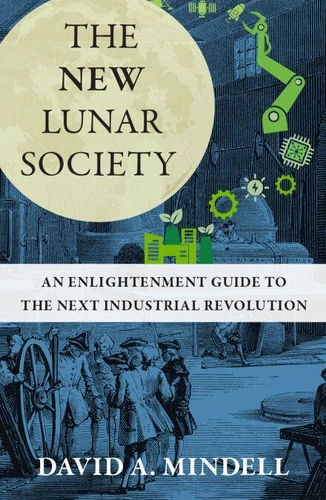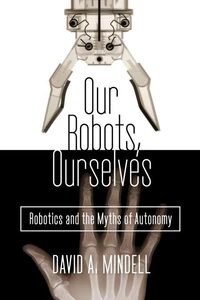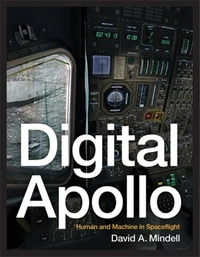The New Lunar Society. An Enlightenment Guide to the Next Industrial Revolution
Par :Formats :
Disponible dans votre compte client Decitre ou Furet du Nord dès validation de votre commande. Le format ePub protégé est :
- Compatible avec une lecture sur My Vivlio (smartphone, tablette, ordinateur)
- Compatible avec une lecture sur liseuses Vivlio
- Pour les liseuses autres que Vivlio, vous devez utiliser le logiciel Adobe Digital Edition. Non compatible avec la lecture sur les liseuses Kindle, Remarkable et Sony
- Non compatible avec un achat hors France métropolitaine
 , qui est-ce ?
, qui est-ce ?Notre partenaire de plateforme de lecture numérique où vous retrouverez l'ensemble de vos ebooks gratuitement
Pour en savoir plus sur nos ebooks, consultez notre aide en ligne ici
- Nombre de pages288
- FormatePub
- ISBN978-0-262-38188-8
- EAN9780262381888
- Date de parution25/02/2025
- Protection num.Adobe DRM
- Taille1 Mo
- Infos supplémentairesepub
- ÉditeurThe MIT Press
Résumé
How to create our industrial future with inspiration and lessons from the originators of the industrial revolution. Climate change, global disruption, and labor scarcity are forcing us to rethink the underlying principles of industrial society. In The New Lunar Society, David Mindell envisions this new industrialism from the fundamentals, drawing on the eighteenth century when first principles were formed at the founding of the Industrial Revolution.
While outlining the new industrialism, he tells the story of the Lunar Society, a group of engineers, scientists, and industrialists who came together to apply the principles of the Enlightenment to industrial processes. Those principles were collaboration, the marriage of practical and scientific knowledge, and the belief that the world could progress through making things. The Lunar Society included pioneers like James Watt, Benjamin Franklin, and Josiah Wedgwood, and their conversations no less than ignited the Industrial Revolution and shaped the founding of the United States.
Telling the stories of these makers in parallel with those of our current moment of crisis on multiple fronts, Mindell argues for a new industrialism. He asks: What does industry look like when it strives to optimize for the lowest carbon footprint as well as the greatest profit? When it values resilience as much as efficiency? When it upholds dignified, inclusive, sustainable work? Optimistic but not utopian about our ability to build the world, The New Lunar Society shines a light on how a new generation can reanimate the best ideas of our thinking doer forebears and begin to build a future that is both realistic and human-centered.
While outlining the new industrialism, he tells the story of the Lunar Society, a group of engineers, scientists, and industrialists who came together to apply the principles of the Enlightenment to industrial processes. Those principles were collaboration, the marriage of practical and scientific knowledge, and the belief that the world could progress through making things. The Lunar Society included pioneers like James Watt, Benjamin Franklin, and Josiah Wedgwood, and their conversations no less than ignited the Industrial Revolution and shaped the founding of the United States.
Telling the stories of these makers in parallel with those of our current moment of crisis on multiple fronts, Mindell argues for a new industrialism. He asks: What does industry look like when it strives to optimize for the lowest carbon footprint as well as the greatest profit? When it values resilience as much as efficiency? When it upholds dignified, inclusive, sustainable work? Optimistic but not utopian about our ability to build the world, The New Lunar Society shines a light on how a new generation can reanimate the best ideas of our thinking doer forebears and begin to build a future that is both realistic and human-centered.
How to create our industrial future with inspiration and lessons from the originators of the industrial revolution. Climate change, global disruption, and labor scarcity are forcing us to rethink the underlying principles of industrial society. In The New Lunar Society, David Mindell envisions this new industrialism from the fundamentals, drawing on the eighteenth century when first principles were formed at the founding of the Industrial Revolution.
While outlining the new industrialism, he tells the story of the Lunar Society, a group of engineers, scientists, and industrialists who came together to apply the principles of the Enlightenment to industrial processes. Those principles were collaboration, the marriage of practical and scientific knowledge, and the belief that the world could progress through making things. The Lunar Society included pioneers like James Watt, Benjamin Franklin, and Josiah Wedgwood, and their conversations no less than ignited the Industrial Revolution and shaped the founding of the United States.
Telling the stories of these makers in parallel with those of our current moment of crisis on multiple fronts, Mindell argues for a new industrialism. He asks: What does industry look like when it strives to optimize for the lowest carbon footprint as well as the greatest profit? When it values resilience as much as efficiency? When it upholds dignified, inclusive, sustainable work? Optimistic but not utopian about our ability to build the world, The New Lunar Society shines a light on how a new generation can reanimate the best ideas of our thinking doer forebears and begin to build a future that is both realistic and human-centered.
While outlining the new industrialism, he tells the story of the Lunar Society, a group of engineers, scientists, and industrialists who came together to apply the principles of the Enlightenment to industrial processes. Those principles were collaboration, the marriage of practical and scientific knowledge, and the belief that the world could progress through making things. The Lunar Society included pioneers like James Watt, Benjamin Franklin, and Josiah Wedgwood, and their conversations no less than ignited the Industrial Revolution and shaped the founding of the United States.
Telling the stories of these makers in parallel with those of our current moment of crisis on multiple fronts, Mindell argues for a new industrialism. He asks: What does industry look like when it strives to optimize for the lowest carbon footprint as well as the greatest profit? When it values resilience as much as efficiency? When it upholds dignified, inclusive, sustainable work? Optimistic but not utopian about our ability to build the world, The New Lunar Society shines a light on how a new generation can reanimate the best ideas of our thinking doer forebears and begin to build a future that is both realistic and human-centered.






